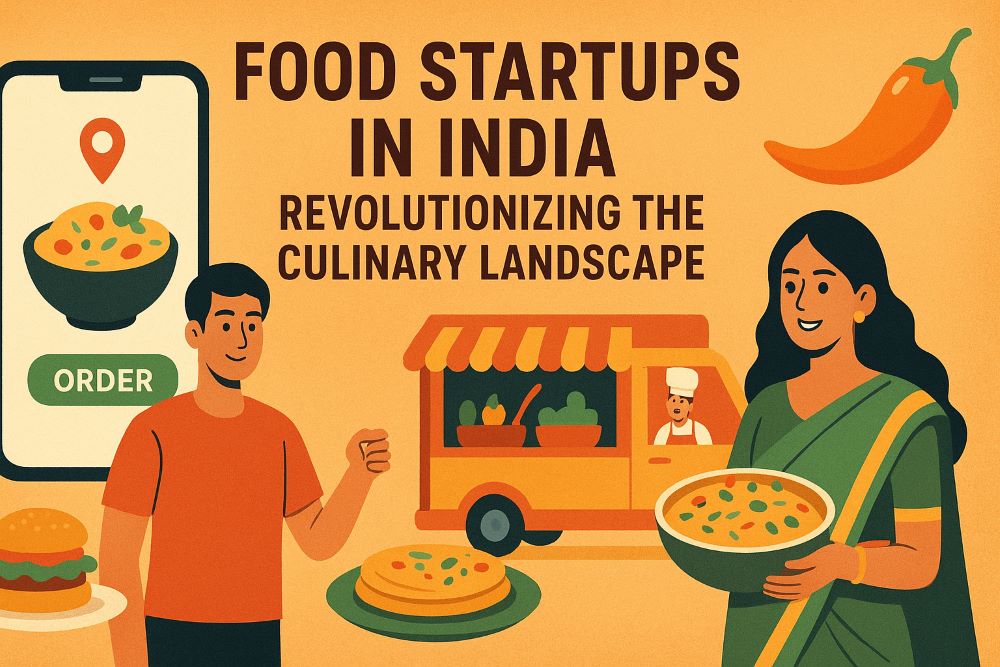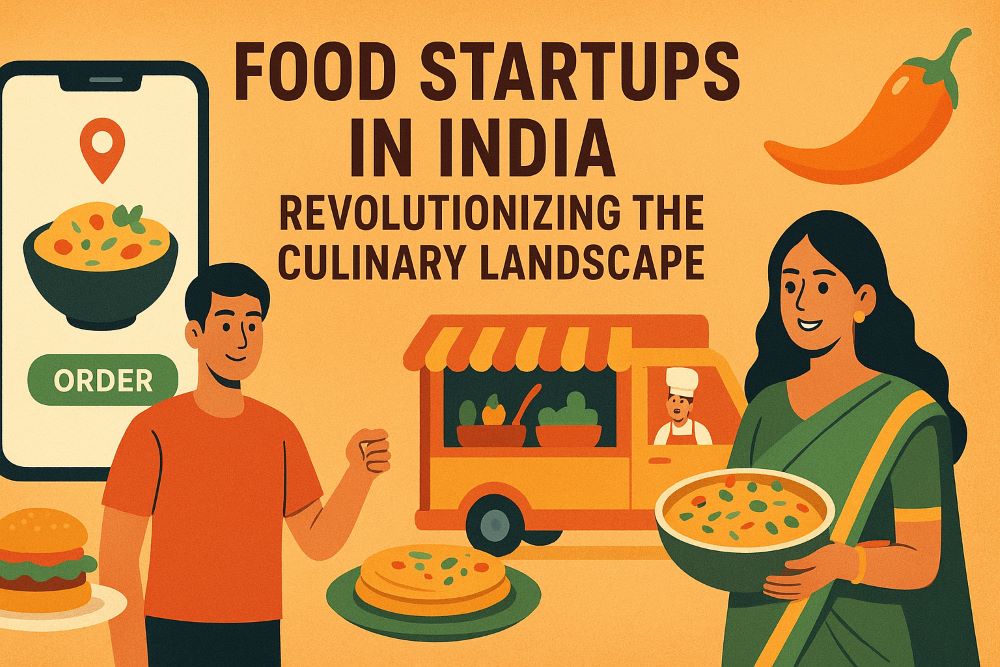The food industry in India has always been vibrant, reflecting the nation’s diverse culture, flavors, and traditions. In recent years, food startups in India have emerged as game changers, transforming the way Indians cook, eat, and experience food. With increasing consumer awareness, digital penetration, and changing lifestyles, these startups are not just serving food—they are crafting experiences, driving innovation, and contributing significantly to the economy.
India, home to more than 1.3 billion people, represents a massive market for innovative food products. From cloud kitchens to organic food delivery, meal subscription services to tech-driven grocery platforms, the scope for food startups in India is enormous. This article explores the landscape of food startups in India, their challenges, opportunities, and success stories.
The Rise of Food Startups in India
Over the past decade, India has witnessed an unprecedented growth of food startups. Urbanization, a growing middle class, and tech-savvy consumers have fueled this growth. Millennials and Gen Z, who prioritize convenience, health, and sustainability, have played a significant role in shaping the food ecosystem.
Several factors have contributed to the rise of food startups in India:
- Changing Consumer Preferences: Traditional eating habits are evolving. Consumers now seek healthier, ready-to-eat, and gourmet options.
- Digital Transformation: Food delivery apps and online marketplaces have made it easier for startups to reach customers across cities.
- Access to Funding: Venture capitalists and angel investors are increasingly investing in foodtech innovations.
- Government Support: Initiatives like “Make in India” and startup-friendly policies encourage entrepreneurship in the food sector.
Key Segments of Food Startups in India

The food startup ecosystem in India is diverse, covering multiple segments. Some prominent categories include:
Online Food Delivery Platforms
The convenience of ordering food online has skyrocketed the demand for delivery platforms. Startups are leveraging technology to connect restaurants with customers, optimizing delivery times, and enhancing the overall dining experience.
Cloud Kitchens
Cloud kitchens, also known as virtual kitchens, operate without a physical dine-in space. These kitchens focus solely on delivery, reducing operational costs. The cloud kitchen model has gained immense popularity among food startups in India, especially post-pandemic.
Organic and Health Foods
Consumers are increasingly conscious of their health and diet. Startups specializing in organic, gluten-free, vegan, and keto-friendly foods are thriving. These startups cater to health-conscious urban populations seeking quality ingredients and safe food options.
Gourmet and Specialty Foods
Luxury and gourmet food products have found a niche in urban markets. From artisanal chocolates to craft beverages, startups are introducing unique culinary experiences to Indian consumers.
Foodtech and Grocery Platforms
Technology-driven grocery and food supply platforms streamline sourcing, logistics, and distribution. These startups ensure fresh produce and essential ingredients are available to consumers quickly, efficiently, and cost-effectively.
Success Stories of Food Startups in India
India’s food startup ecosystem has witnessed remarkable success stories, inspiring new entrepreneurs. Some of the standout examples include:
- Innovative Meal Delivery Services: Startups offering subscription-based meal plans for busy professionals have gained immense popularity. These services focus on balanced diets, portion control, and convenience.
- Cloud Kitchen Pioneers: Virtual kitchens delivering multi-cuisine menus across urban cities have disrupted traditional restaurant models. These startups have scaled rapidly by leveraging delivery platforms and AI-powered operations.
- Organic Food Leaders: Startups providing farm-to-fork organic produce have become trusted names among health-conscious consumers. They emphasize transparency, quality, and sustainability in their offerings.
Challenges Faced by Food Startups in India
While the food startup ecosystem in India is thriving, several challenges persist:
- High Competition: The food industry is crowded, and startups must differentiate themselves to succeed.
- Operational Costs: Managing logistics, inventory, and supply chain efficiently is a significant challenge, particularly for perishable goods.
- Regulatory Compliance: Navigating food safety standards, licenses, and certifications can be complex for new startups.
- Consumer Trust: Building credibility and trust is critical, especially for startups dealing with health foods or organic products.
Opportunities in the Indian Food Startup Market
Despite challenges, the opportunities for food startups in India are immense:
- Tier-2 and Tier-3 Cities: Expanding beyond metropolitan areas presents a massive untapped market.
- Technology Integration: AI, IoT, and data analytics can optimize supply chains, improve customer experience, and increase efficiency.
- Sustainable Practices: Eco-friendly packaging, zero-waste initiatives, and sustainable sourcing are gaining traction.
- Collaborations and Partnerships: Partnering with established food brands, delivery platforms, or grocery chains can accelerate growth.
Role of Technology in Food Startups in India
Technology plays a pivotal role in transforming the food startup ecosystem. From app-based ordering systems to AI-driven inventory management, tech innovation has made operations more efficient and customer-friendly. Key technological trends include:
- AI and Machine Learning: Predicting customer preferences, managing inventory, and optimizing delivery routes.
- Blockchain: Ensuring transparency and traceability in the supply chain, especially for organic and specialty foods.
- Mobile Apps and Online Platforms: Enhancing customer engagement, loyalty, and repeat business.
- Automation: Robotics in cloud kitchens and packaging units reduces manual effort and operational errors.
Investment Trends in Food Startups in India
India has become a hotspot for investors interested in foodtech. Venture capitalists are actively funding startups across segments like meal delivery, cloud kitchens, and health foods. Investment trends indicate:
- Early-stage funding is focused on innovative ideas with scalable models.
- Growth-stage funding prioritizes operational efficiency, market expansion, and technology integration.
- Strategic investors from FMCG and restaurant chains are collaborating with startups to co-develop products and expand market reach.
Future of Food Startups in India
The future of food startups in India looks promising. Emerging trends and evolving consumer behavior suggest that:
- Plant-based and alternative protein foods will see significant growth.
- Hyper-local food delivery models will gain traction.
- Integration of AI, IoT, and robotics will optimize operations and reduce costs.
- Personalized nutrition and diet-based food services will become mainstream.
With the right blend of innovation, technology, and customer-centric strategies, food startups in India have the potential to redefine the food landscape and become global players.
Government Initiatives Supporting Food Startups
The Indian government has been proactive in supporting entrepreneurship through policies and schemes. Initiatives include:
- Startup India Program: Provides funding support, tax exemptions, and mentorship to food startups.
- Food Safety and Standards Authority of India (FSSAI): Helps startups comply with food safety regulations.
- Make in India: Encourages domestic food manufacturing and innovation in processed foods.
These initiatives create a conducive environment for startups to thrive and expand.
Strategies for Success for Food Startups in India
To succeed in the competitive food industry, startups must focus on:
- Understanding Consumer Behavior: Regular market research and feedback collection are crucial.
- Quality and Consistency: Maintaining high standards ensures customer loyalty.
- Innovation: Unique offerings, new cuisines, and health-oriented products differentiate startups.
- Digital Marketing: Strong online presence, social media campaigns, and influencer partnerships increase visibility.
- Scalable Operations: Efficient supply chain, technology integration, and strategic partnerships help scale operations effectively.
Role of Sustainability in Food Startups
Sustainability is no longer optional for food startups. Eco-conscious consumers demand environmentally responsible practices. Startups adopting sustainable sourcing, minimal packaging, and waste reduction not only attract customers but also reduce costs and enhance brand reputation.
Case Studies of Successful Food Startups in India
Examining real-world success stories offers valuable insights for aspiring entrepreneurs:
- Cloud Kitchen Success: A cloud kitchen startup serving multiple cuisines in metro cities achieved exponential growth by leveraging delivery platforms and AI-driven kitchen management.
- Organic Food Delivery: A startup providing certified organic produce directly from farms to consumers built trust and loyalty through transparency and quality assurance.
- Meal Subscription Services: A subscription-based meal service targeting office-goers and students saw rapid adoption due to its focus on nutrition, convenience, and affordability.
Key Trends Shaping Food Startups in India
Several emerging trends are redefining the food startup ecosystem:
- Rise of Plant-Based Foods: Growing awareness of health and environmental impact is driving plant-based food consumption.
- Hyper-Local Delivery Models: Startups are focusing on neighborhood-level delivery to reduce costs and ensure freshness.
- Personalized Nutrition: Diet-specific meal plans based on health goals are gaining popularity.
- Food Subscription Services: Subscription-based models for meals, snacks, and beverages are becoming mainstream.
- Integration of AI and Robotics: Automation in kitchens and delivery enhances efficiency and reduces human error.
Challenges of Scaling Food Startups in India
Scaling a food startup in India comes with unique challenges:
- Supply Chain Complexity: Managing perishable items across cities requires sophisticated logistics.
- Maintaining Quality at Scale: Expansion must not compromise food quality and customer experience.
- Competitive Market: Startups must continuously innovate to stay ahead.
- Regulatory Compliance: Navigating multiple licenses, certifications, and food safety standards can slow expansion.
How Food Startups Are Impacting the Indian Economy
Food startups in India contribute significantly to employment, innovation, and GDP. By creating new business models, they are:
- Generating jobs across kitchens, logistics, marketing, and technology sectors.
- Driving innovation in food processing, packaging, and delivery.
- Promoting entrepreneurship and attracting domestic and foreign investments.
The Role of Social Media in Promoting Food Startups
Social media has become a powerful tool for food startups to connect with customers, showcase products, and build brand identity. Instagram, Facebook, and YouTube are popular platforms for:
- Sharing visually appealing food content.
- Engaging customers through contests, reviews, and stories.
- Leveraging influencers to increase reach and credibility.
Conclusion
The landscape of food startups in India is dynamic, promising, and highly competitive. With innovation, technology, and consumer-centric strategies, these startups are transforming the way Indians experience food.
As the market continues to grow, there is immense potential for entrepreneurs to explore niches like cloud kitchens, organic foods, health-focused meals, and tech-driven grocery solutions. By understanding market trends, embracing sustainability, leveraging technology, and prioritizing quality, food startups in India can achieve long-term success and make a lasting impact on the culinary industry.
For aspiring entrepreneurs, this is the perfect time to enter the food sector, innovate, and contribute to shaping the future of food in India. The journey may be challenging, but the rewards—both financial and social—are substantial.


